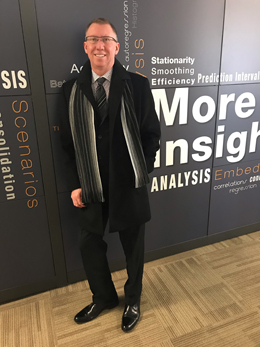Offering more options for transplant: One man’s successful transplant journey made possible by the only hospital in Canada to offer a rare procedure

By Ana Gajic

Paul was diagnosed with ADKPD in his twenties. Then, at age 44, the disease “took an exponential decline.” (Photos courtesy of Paul)
When Paul looks back on life before transplant, he compares it to being a prisoner in his own body.
“You feel like there’s this better person inside of you that’s locked in a cage,” he said. “And you just know you’re a better person, but you’re locked in there and you can’t get out.”
Paul was diagnosed with autosomal dominant polycystic kidney disease (ADKPD) in his twenties. The disease is progressive, and causes the kidney to enlarge and develop cysts. For about 20 years, Paul didn’t show symptoms.
Then, at age 44, the disease “took an exponential decline,” he recalled.
“It’s like all of a sudden someone flipped a switch. Every day I woke up, I felt like a two out of 10. You feel alive, but you’re sucked of energy.”
Paul went on peritoneal dialysis, which uses the lining of a person’s abdomen to filter their blood. Dialysis solution – which is made of salt and other additives – flows from a bag through a catheter to the abdomen and filters waste from the body.
Many people find dialysis mentally and physically exhausting, but Paul was determined to continue working. He owns his own company, which creates disease models for large pharmaceutical companies. As CEO and primary salesman, he setup a special spot in the office to perform his “twin-bag” dialysis exchanges.
“I would be sitting at meetings, at a boardroom table, doing peritoneal dialysis,” he said. “I never really took a break.”
Initially, a potential donor came forward but was unfortunately not eligible to donate. Soon after, another friend Paul hadn’t seen for 20 years offered to be his kidney donor in 2017. The two had incompatible blood types, which normally rules out a donor pair – except St. Michael’s Kidney Transplant Program has an innovative technique that makes these situations work.
“At St. Michael’s, we are the only centre in Canada to offer Immunoadsorption therapy for ABO-incompatible (ABOi), or blood-type incompatible, transplant in living directed organ donation,” said Michelle Gabriel, a registered nurse in the Kidney Transplant Program. “This makes organ donation for two people without the same blood type possible, as long as their immune systems are compatible.”

In these cases, the team evaluates the transplant recipient and donor’s immune systems and antibodies. If the two are deemed compatible, the recipient goes through a treatment similar to dialysis before surgery, Gabriel said. The immunoadsorption treatment offered at St. Michael’s is unique, because only very specific antibodies get removed during treatment, which is safer and has fewer side effects. On average, patients need three to five treatments before surgery, which prepares them to receive a kidney from a donor with an incompatible blood type. This technology originated in Europe.
The Kidney Transplant Program is careful to evaluate risks before moving forward with ABOi, said Galo Meliton, registered nurse in the program. For instance, if the pair’s blood types and tissues are incompatible, the team will not proceed with ABOi, because that is too much of a difference. If just the blood types are incompatible, then ABOi is an option.
“I am so proud to be a witness to the adoption of this technological innovation at St. Michael’s,” Meliton said. “If a pair is a candidate, this can sometimes speed up the transplant process for a patient. But we always let the donor and recipient pair choose – I always say, we’re the bus drivers. They tell us where they want to go, and we do our best to get there.”
According to Gabriel, ABOi transplant is one way to “get creative” in order to ensure those who need a transplant and have a willing and able donor receive it.
“This has been a game-changer – for us, for our patients, and for St. Michael’s,” Meliton said.
For Paul, this option was a true lifesaver.
“The willingness from St. Michael’s to be a true innovator and invest in new techniques impresses me,” he said. “Now I’m back to living a good life, contributing to Canada, hiring new and young people – what a return on the investment. It’s a true multiplier effect.”
Since his transplant, Paul said he wakes up most days as a nine out of 10 – far from his past days as a two before transplant. He does intensive fitness programs, is back to golfing, works out six days a week, and his company continues to thrive with him at the helm.
“You can’t find a guy that’s happier than me,” he said. “Everything centres back to the transplant, St. Michael’s, and their ability to offer ABOi as an option.”
His commitment to better himself every day stems from a commitment to his donor, whom he describes as truly selfless.
“There’s a special type of person out there who’s ready to make such a selfless commitment, but there’s still a lack of knowledge around living kidney donation, so there are many special people who don’t come forward.”
He’s sharing his story to raise awareness about the power of transplant and the options for live donation.
“With living donation or deceased, there needs to be awareness of the huge amount of lives that can be saved and changed by a single person’s decision to donate. This gave me a second chance at life and I’ve never felt this good.”
Paul is the second in a series of patients we’re profiling to celebrate our Kidney Transplant Program’s 50th anniversary. It’s called a called #MyTXanniversary, and we want to encourage more people to register as organ donors and highlight its patients and staff by sharing stories of their own transplant anniversaries.
Sign up to be a donor, or check your registration status online today at our donor drive.
About St. Michael’s Hospital
St. Michael’s Hospital provides compassionate care to all who enter its doors. The hospital also provides outstanding medical education to future health care professionals in more than 29 academic disciplines. Critical care and trauma, heart disease, neurosurgery, diabetes, cancer care, care of the homeless and global health are among the Hospital’s recognized areas of expertise. Through the Keenan Research Centre and the Li Ka Shing International Healthcare Education Centre, which make up the Li Ka Shing Knowledge Institute, research and education at St. Michael’s Hospital are recognized and make an impact around the world. Founded in 1892, the hospital is fully affiliated with the University of Toronto.
About Unity Health Toronto
Unity Health Toronto, comprised of Providence Healthcare, St. Joseph’s Health Centre and St. Michael’s Hospital, works to advance the health of everyone in our urban communities and beyond. Our health network serves patients, residents and clients across the full spectrum of care, spanning primary care, secondary community care, tertiary and quaternary care services to post-acute through rehabilitation, palliative care and long-term care, while investing in world-class research and education. For more information, visit www.unityhealth.to.
